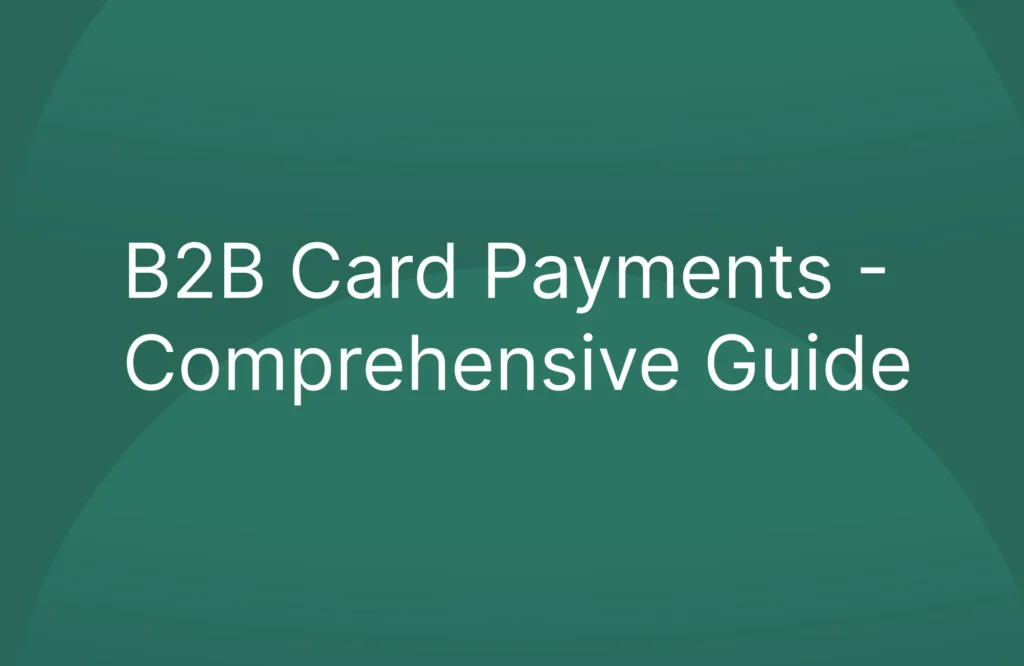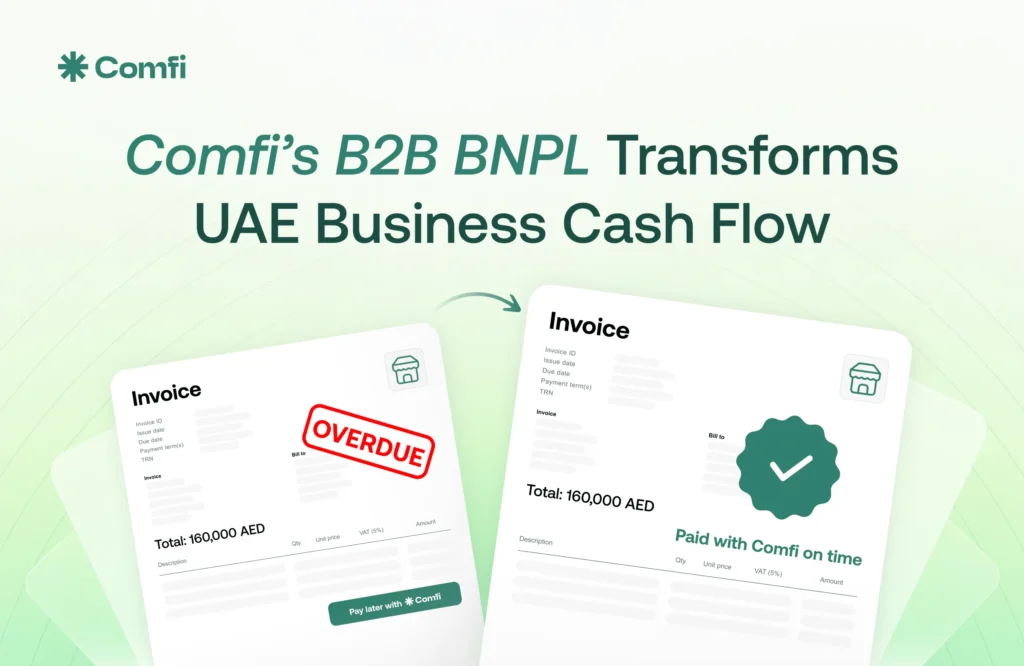Comprehensive guide to B2B Card Payments
B2B card payments are becoming increasingly popular in the business world. They offer a simple and efficient way for companies to handle transactions. As businesses look for ways to improve their payment processes, B2B card payments are emerging as a reliable solution. This article will explain what they are, their benefits, the challenges they pose, and what the future might hold for this payment method.
What Are B2B Card Payments?
B2B card payments are transactions between businesses using credit cards, debit cards, or virtual cards. Unlike traditional payment methods like checks or wire transfers, B2B card payments provide a faster and more convenient way to handle transactions. These payments can be made using physical cards or virtual cards, which are digital versions of credit or debit cards.
Key Features of B2B Card Payments
- Speed and Convenience: B2B card payments are processed quickly, often within minutes.
- Security: These payments come with advanced security features such as encryption and fraud protection.
- Record Keeping: Transactions made with cards are easily tracked and recorded, making accounting simpler.
- Rewards and Incentives: Many business credit cards offer rewards, cashback, or other incentives for use.
Benefits of B2B Card Payments for Businesses
Faster Payments
B2B card payments are processed quickly, which helps businesses manage their cash flow better. Instead of waiting for checks to clear or wire transfers to process, companies can complete transactions almost instantly.
Improved Cash Flow Management
With B2B card payments, businesses can maintain better control over their cash flow. They can make payments when needed and take advantage of early payment discounts offered by suppliers.
Enhanced Security
Using cards for B2B payments provides an extra layer of security. Advanced encryption and fraud protection measures help keep financial information safe from unauthorized access.
Simplified Record Keeping
Every transaction made with a card is recorded, which simplifies accounting and financial tracking. This makes it easier for businesses to keep accurate records and manage their finances efficiently.
Access to Rewards and Incentives
Many business credit cards offer rewards such as cashback, travel points, or discounts on business services. These incentives can add value to the payment process and help businesses save money.
Leading UAE B2B Payment Brand: Comfi
Comfi’s B2B payment platform provides embedded finance solutions, allowing wholesalers and manufacturers to provide up to 90 days of credit to their B2B clients while receiving immediate payment.
Comfi’s solutions are designed for UAE-based businesses, enabling them to purchase from various suppliers with deferred payment terms, effectively bridging cash flow gaps.
Comfi works with suppliers in diverse industries, including but not limited to F&B, pharmaceuticals, medical supplies, spare parts, and chemicals. Some notable customers include KMTE Group, United Foods, Medikabazaar, and 64 Sec. We are Shariah-compliant and work in partnership with a local partner bank (FAB) to facilitate approvals and payments. Learn more about comfi and its products at comfi.ai
Challenges in Implementing B2B Card Payments
High Transaction Fees
One of the main challenges of using B2B card payments is the high transaction fees. Credit card companies often charge merchants a percentage of each transaction, which can add up over time.
Limited Acceptance
Not all suppliers and vendors accept card payments. This can limit the usefulness of B2B cards for some businesses, forcing them to rely on other payment methods.
Security Concerns
While B2B cards offer enhanced security, they are not entirely immune to fraud and cyber-attacks. Businesses must implement strict security measures to protect their card information.
Integration with Existing Systems
Integrating B2B cards with existing accounting and financial systems can be complex. It requires careful planning and coordination to ensure seamless operation.
Industries That Can Benefit Most from B2B Card Payments
Retail
The retail industry can benefit greatly from B2B cards. Quick and efficient transactions help retailers manage their inventory and cash flow effectively.
Manufacturing
Manufacturing companies often deal with large transactions. B2B cards can help streamline the payment process and improve financial management.
Professional Services
Firms in professional services, such as law, accounting, and consulting, can use B2B cards to simplify billing and payment processes, leading to better cash flow management.
Travel and Hospitality
The travel and hospitality industry can benefit from the speed and convenience of B2B cards. These payments make it easier to handle large volumes of transactions quickly and securely.
Leading UAE B2B Payment Provider: comfi.ai
Comfi makes business buying and selling easier in UAE:
For sellers:
- Get paid fast
- Buyers can pay Comfi in 90 days
For buyers:
- Buy from many sellers
- Pay Comfi later
Comfi works with various industries like food, medicine, and chemicals.
Comfi follows Islamic finance rules and partners with FAB bank.
UAE businesses can learn more at comfi.ai
Steps for Getting Started with B2B Card Payments
Assess Your Needs
Begin by evaluating your current payment processes and identifying areas where B2B card could add value. Consider factors such as transaction volumes, costs, and security requirements.
Choose the Right Card Provider
Select a card provider that meets your business needs. Look for features such as low transaction fees, strong security measures, and rewards programs that benefit your business.
Integrate with Your Systems
Work with your IT team or a technology partner to integrate the chosen card payment system with your existing accounting and financial systems. Ensure the integration is smooth and does not disrupt business operations.
Train Your Staff
Provide training to your employees on how to use the new card payment system. Ensure they understand the benefits and how to handle transactions securely.
Communicate with Stakeholders
Inform your suppliers and vendors about your transition to payments in B2B card. Provide guidance on how they can accept card payments and the benefits of doing so.
Monitor and Optimize
Regularly review your B2B card payment processes to identify areas for improvement. Monitor key performance indicators such as processing times, costs, and security incidents. Continuously optimize your system to ensure it meets your business needs.
Read also: Trade Finance Officer in the UAE
Future Trends and Developments in B2B Card Payments
Increased Use of Virtual Cards
Virtual cards are becoming more popular in the B2B space. They offer enhanced security and convenience, making them an attractive option for businesses looking to streamline their payment processes.
Integration with Mobile Payment Solutions
As mobile technology advances, we can expect to see more integration of B2B card payments with mobile payment solutions. This will provide businesses with even more flexibility and convenience in handling transactions.
Enhanced Security Measures
Future developments in B2B payments will likely focus on enhancing security. This may include the use of biometric authentication, advanced encryption techniques, and real-time fraud detection.
Expansion of Reward Programs
We can expect to see more business credit card providers offering expanded reward programs tailored to the needs of businesses. These programs will provide additional value and incentives for using cards in B2B.
Growth of Blockchain-Based Card Payments
Blockchain technology is poised to revolutionize B2B card payments. The transparency, security, and efficiency offered by blockchain can help businesses streamline their financial transactions and reduce the risk of fraud.
Conclusion
B2B card payments offer a simple, efficient, and secure way for businesses to handle transactions. They provide numerous benefits, including faster payments, improved cash flow management, enhanced security, simplified record keeping, and access to rewards and incentives. While there are challenges to implementing B2B card payments, such as high transaction fees and limited acceptance, the advantages make them a valuable option for many businesses.
As technology continues to evolve, we can expect to see further advancements in B2B card payments. Increased use of virtual cards, integration with mobile payment solutions, enhanced security measures, expanded reward programs, and the growth of blockchain-based payments are just a few of the trends that will shape the future of B2B transactions.


